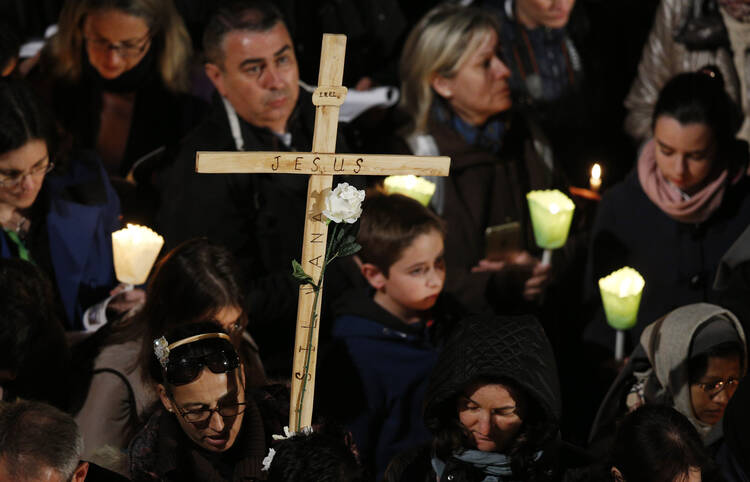Gospel: The New Cross
In the Apostle Paul’s letters, especially in Galatians, Paul sees boasting as the core of the spiritual sins that haunt the church. Boasting reflects more than just a problematic personality or character trait. For Paul, boasting in anything other than Christ is a sign of the “old creation,” a refusal to be transformed by Christ into a “new creation.” The cross, though, is the emblem of how the old ways are made new in Christ.
To think of what the cross was in the old creation is to recognize it simply as a tool of capital punishment by the Roman state and its functionaries. There was nothing transformative about the broken bodies of slaves or insurrectionists hung out publicly for all to see. But for Paul, the cross, though outwardly the same instrument of torture and torment as before, has been transformed by Jesus into the means of grace by which humanity is brought into the family of God. As a result, when Paul speaks to the Galatians, he tells them that he would “never boast of anything except the cross of our Lord Jesus Christ.”
In the same way that the humiliation and cruelty of the cross became through Christ’s sacrifice a source of God’s love, so we, too, are to be transformed by God’s love from those who glory in achievement, ethnicity and expertise to those who boast in the cross. It is no longer about the things that used to define us; in Christ “a new creation is everything.” Boasting apart from Christ is the epitome of the old ways.
In the Septuagint Bible, the common Greek verb for “to boast,” kauchaomai, takes on a religious flavor, which is seen in Paul’s own writing. Ceslas Spicq writes in the Theological Lexicon of the New Testament that the peculiar contribution of the Jewish scriptures to an understanding of kauchaomai “is to give the verb a religious meaning and to pose the contrast between human vainglory and divine honor.” This is what Paul’s contrast is driving at—not an argument against human worthwhileness, but an understanding that all of us are valuable to God simply for who we are as human beings and that God has saved us not because of our achievements or holiness but because God loves us. This is our boast, and it belongs to all who belong to Christ.
What it means to be a “new creation” for Paul is to be transformed by the cross of Christ and in light of our eternal goal and purpose into people who glory in the love of neighbor and of God and not our achievements. Paul did not stop being the apostle who “worked harder than any of them,” nor should people stop using their gifts to be the best ski instructor, or chocolate maker, or teacher. But for Paul “new creation” gives thanks to God, acknowledging that “it was not I, but the grace of God that is with me” (1 Cor 15:10). “New creation” glories not in oneself but the good gifts that have been graciously showered on each of us for the benefit of all.
For Paul, the heart of his “new creation” was doing it all for the glory of God’s reign. This meant Paul had to “carry the marks [stigmata] of Jesus branded on my body.” While these are not the stigmata as later understood by the tradition, they are most probably the wounds he received for his apostolic work as a member of Christ’s body, and these he bore happily because it was a boast about the nature of his solidarity with Christ’s sacrifice. Though his body was marked, the marks defined him as one who offered honor to God. They were visible signs that the body of Christ took precedence, not Paul’s. They were the marks of “new creation.”
The marks we have gained as members serving the body of Christ might be different. They might not be physical but emotional, spiritual or psychological. The marks might not be visible, but they too are signs of “new creation,” of the times when we have been marked by our love of Christ. They do not mark us as weak or strong, but as members of God’s family, those who seek to be transformed as “new creations” who boast only in the cross.
This article also appeared in print, under the headline “The New Cross,” in the June 20-27, 2016, issue.








